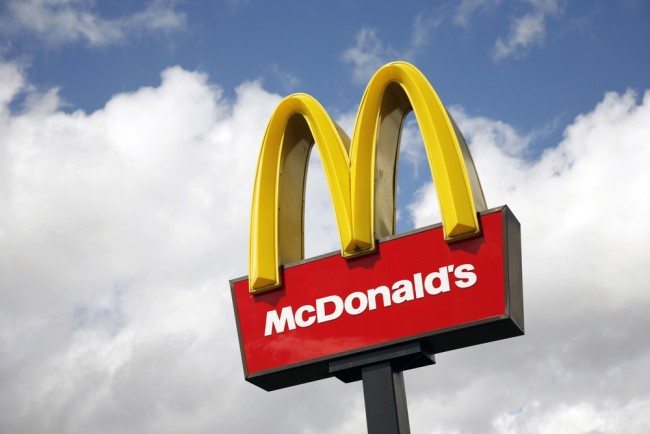McDonald’s faces its first strike since it opened in the UK in 1974, as well as protests by unions and the public at several restaurants over pay and working conditions, reports The Guardian.
About 40 staff will go on strike on Monday at two restaurants in Cambridge and Crayford, south-east London, after a ballot in favour of industrial action amid concerns over low wages and the use of zero-hours contracts.
The fast-food chain has been one of the biggest users of zero-hours contracts in Britain, although it has recently started offering workers the option of moving to fixed hours.
The Bakers, Food and Allied Workers Union, one of Britain’s oldest trade unions, said staff were demanding a wage of at least £10 an hour, more secure working hours and union recognition.
The strike has been backed by Jeremy Corbyn. In a statement, the Labour leader said: “Our party offers support and solidarity to the brave McDonald’s workers, who are making history today. They are standing up for workers’ rights by leading the first ever strike at McDonald’s in the UK.
“Their demands – an end to zero-hours contracts by the end of the year, union recognition and a £10 per hour minimum wage – are just, and should be met.”
McDonald’s said those taking action represented 0.01% of its UK workforce and said the dispute was related to its internal grievance procedures.
Staff in Cambridge and Crayford will mount early morning picket lines before attending a rally in Westminster.
The company said all its 115,000 staff in the UK, where it has 1,249 restaurants, would be offered the option of taking a contract with guaranteed hours by the end of the year. It said so far 86 per cent of employees had chosen to stay on flexible contracts.
More than 100 union and Labour party members along with McDonald’s workers protested outside the company’s headquarters in East Finchley, London, on Saturday. The company was expecting further “solidarity protests” outside several restaurants on Monday, but stressed that if they did not involve employees, its outlets would stay open.
Ian Hodson, BFAWU’s national president, told the Guardian: “This is the second-largest restaurant company in the world that makes $22bn (£17bn) revenues a year, and yet its workers are living in poverty. They have been the pioneers of zero-hours contracts.”
He said McDonald’s had started offering some staff the option of moving on to guaranteed-hours contracts two weeks ago.
Hodson said the strike might spread. “McDonald’s has had countless opportunities to resolve grievances by offering workers a fair wage and acceptable working conditions. This is a call for change.
“For far too long, workers in fast food restaurants such as McDonald’s have had to deal with poor working conditions, drastic cuts to employee hours, and even bullying in the workplace – viewed by many as a punishment for joining a union.”
Steve, 25, who works at the Cambridge McDonald’s and gets paid £7.60 an hour on a zero-hours contract, explained why he had chosen to strike. He said: “I get about 35 hours a week but even so I can only afford to live because I get all my meals at McDonalds.
“Rent is expensive in Cambridge and although I have a roof over my head, I am sleeping on a mattress on the floor. Before I moved into my current house-share four weeks ago, I was sofa-surfing while trying to save the deposit.”
There was also always a fear that he would get no shifts next week. “It’s happened to a friend of mine who went on holiday who came back to just one shift a week instead of five,” he said. “No explanation was given, because they don’t have to give one.”
Steve said it was not only pay and contracts that were the problem. He said: “We are also striking because of the bullying and harassment that goes on. There has been some truly appalling behaviour.”
He admitted he was anxious about striking but had received countless messages of support from all over the world. “I’ve had emails from unions in South Africa and McDonald’s workers in New Zealand. I’ve never felt so supported in my whole life.”
Tyrone, 17, who also works at McDonald’s in Cambridge, told the Guardian last week he was paid £4.75 an hour, just above the legal minimum for a worker his age. Despite working four shifts a week of up to eight hours, he is homeless and sleeps on an airbed in a friend’s flat.
Hodson said Tyrone was one of the McDonald’s staff involved in the dispute, after his hours were cut “by a bullying manager”. The internal grievance cases included claims of bullying and sexual harassment, Hodson said.
The McDonald’s chief executive, Steve Easterbrook, last year took home a total pay package of $15.35m (£11.8m).
A McDonald’s spokesman said: “As announced in April this year, together with our franchisees, we are providing our people with the option of a guaranteed-hour contract, and all restaurants will have these contracts in place by the end of 2017.
He said McDonald’s and its franchisees had awarded staff three pay rises since April 2016, which increased the average hourly pay rate by 15 per cent.
McDonald’s says all its hourly pay rates are above the national living wage. For under-18s this is £5.42, for 18- to 20-year-olds it is £6.84, for 21- to 24-year-olds the rate is £8.13 and for over-25s it is £8.31.
The spokesman added: “We are proud of our people at McDonald’s. They are at the heart of all we do and we work hard to ensure that our teams are treated fairly. Our internal processes underpin that commitment.”


